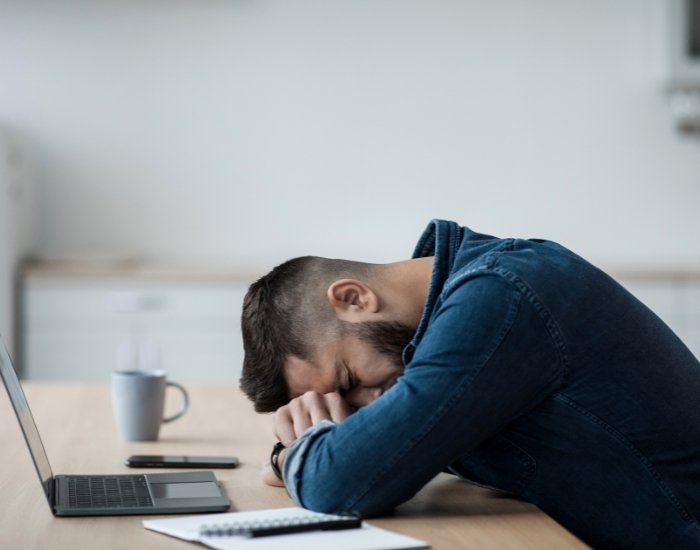Inflammatory Bowel Disease (IBD), which includes Crohn’s disease and ulcerative colitis, is known for its impact on the digestive system, causing symptoms like abdominal pain, diarrhea, and weight loss. However, many people with IBD also experience a less visible but equally debilitating symptom: extreme fatigue. This overwhelming sense of tiredness can affect every aspect of life, from work to social activities, and is often one of the most challenging symptoms for patients to manage.
Understanding why fatigue occurs in IBD is essential for finding effective solutions. Let’s dive into the key reasons behind this phenomenon and explore ways to manage it.
The Link Between IBD and Fatigue
Fatigue in IBD is not the same as simply feeling tired after a long day. It’s a persistent and profound exhaustion that doesn’t improve with rest. This type of fatigue is multi-faceted, with physical, emotional, and biochemical factors all contributing to the problem.
At its core, fatigue in IBD often stems from the body’s inflammatory response. Inflammation is a hallmark of IBD, and when the immune system is chronically activated, it can lead to systemic effects that go far beyond the digestive system. Chronic inflammation drains the body’s energy reserves, leaving patients feeling physically and mentally exhausted.
Chronic Inflammation and Fatigue
In IBD, the immune system mistakenly attacks the lining of the gastrointestinal tract, causing inflammation. This ongoing battle triggers the release of inflammatory molecules, such as cytokines, which can interfere with normal cellular processes throughout the body. Cytokines can directly impact energy metabolism, muscle function, and even the brain’s ability to regulate wakefulness and alertness.
Additionally, inflammation can disrupt sleep patterns, as pain and discomfort from symptoms like abdominal cramping or diarrhea often worsen at night. Poor sleep quality exacerbates fatigue, creating a vicious cycle that’s difficult to break.
Nutritional Deficiencies and Energy Levels
People with IBD frequently experience nutrient malabsorption due to inflammation in the gut lining. This can lead to deficiencies in key vitamins and minerals that are crucial for maintaining energy levels. Common deficiencies in IBD patients include:
- Iron: Chronic blood loss from inflamed intestinal tissue or ulcers can lead to anemia, a major contributor to fatigue. Iron is essential for transporting oxygen throughout the body, and low levels can leave you feeling constantly drained.
- Vitamin B12: Absorbed in the ileum (a part of the small intestine often affected by Crohn’s disease), B12 is critical for energy production. A deficiency can result in lethargy and even neurological symptoms.
- Folate: Another nutrient necessary for red blood cell production, folate deficiency can worsen anemia and fatigue.
- Magnesium and Potassium: Chronic diarrhea, a common symptom of IBD, can deplete electrolytes like magnesium and potassium, leading to muscle weakness and exhaustion.
Without these nutrients, the body struggles to perform basic functions, let alone keep up with the demands of daily life.
Medications and Fatigue
Some of the medications used to treat IBD can also contribute to fatigue. For example:
- Corticosteroids: Often prescribed during IBD flare-ups, steroids can disrupt sleep patterns and cause mood swings, which indirectly worsen fatigue.
- Immunosuppressants: These drugs, designed to control inflammation, may affect energy levels by altering immune function.
- Biologic Therapies: While generally effective at reducing inflammation, biologics can occasionally cause side effects like low-grade fatigue during or after treatment.
Patients should discuss any medication-related fatigue with their doctor, as adjustments in treatment may help alleviate the problem.
Emotional and Psychological Factors
Living with a chronic condition like IBD takes a toll on mental health. Anxiety and depression are more common among people with IBD, and these conditions are closely linked to fatigue. When your mental energy is spent dealing with the uncertainty of flare-ups, the stress of managing symptoms, and the emotional burden of chronic illness, it’s no wonder fatigue becomes overwhelming.
Moreover, the stigma or isolation that can accompany IBD—such as avoiding social outings due to symptoms—can amplify feelings of exhaustion. Fatigue, in this context, is not just physical but also deeply emotional.
Fatigue During Flare-Ups vs. Remission
Fatigue is particularly pronounced during IBD flare-ups, when inflammation is at its peak. However, many patients continue to experience fatigue even during remission. This lingering fatigue may be due to residual inflammation, long-term effects of the disease on the body, or the cumulative impact of years of living with a chronic condition.
Understanding this distinction is crucial because it underscores the need for ongoing fatigue management, even when other IBD symptoms are under control.
Managing Fatigue in IBD
Although there’s no one-size-fits-all solution, there are steps you can take to reduce fatigue and improve your quality of life:
- Address Nutritional Deficiencies
Regular blood tests can help identify deficiencies in iron, B12, and other nutrients. Supplements or dietary changes can correct these imbalances. For example, iron supplements or B12 injections may be necessary for those with anemia. - Optimize Medications
If fatigue is a side effect of your current medications, talk to your doctor. They may adjust dosages, switch medications, or recommend supportive therapies to minimize fatigue. - Prioritize Sleep
Creating a sleep-friendly environment—such as a quiet, dark room and a consistent bedtime—can improve sleep quality. If symptoms like nighttime diarrhea are disrupting sleep, your doctor may recommend specific treatments. - Stay Active
Although it may feel counterintuitive, gentle exercise like walking, yoga, or swimming can boost energy levels by improving circulation and releasing endorphins. - Practice Stress Management
Techniques like mindfulness meditation, deep breathing, or cognitive-behavioral therapy (CBT) can help you manage stress, which in turn may reduce fatigue. - Pace Yourself
Fatigue doesn’t mean you need to stop everything; instead, learn to prioritize and pace your activities. Energy-conservation strategies, such as breaking tasks into smaller steps or scheduling rest periods, can help you accomplish more without overexertion.
When to Seek Help for Fatigue
If fatigue is significantly impacting your life, don’t hesitate to seek professional help. Persistent or severe fatigue may indicate an undiagnosed issue, such as worsening inflammation, anemia, or a coexisting condition like hypothyroidism. At United Gastroenterology Associates, our team of specialists can evaluate your symptoms, identify the root cause of your fatigue, and develop a tailored treatment plan to help you feel your best.
Final Thoughts
Fatigue in IBD is a complex issue with multiple contributing factors, from chronic inflammation and nutrient deficiencies to medications and emotional stress. While it can feel overwhelming, understanding the underlying causes and taking proactive steps to address them can make a significant difference.
At United Gastroenterology Associates, we are committed to helping patients with IBD manage not only their digestive symptoms but also the broader impacts of the disease, including fatigue. If you’re struggling with extreme tiredness, contact our team to schedule a consultation and take the first step toward reclaiming your energy and quality of life.
Disclaimer:
The information provided in this blog is for educational purposes only and is not intended as medical advice. It should not be used to diagnose or treat any health condition. Always consult with a qualified healthcare professional for accurate diagnosis and treatment of any symptoms or medical concerns.


